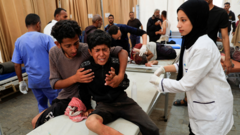As Israel's attacks intensify on Tehran, residents are left in shock and confusion, grappling with emotions ranging from anger towards their own government to fear of being caught in a war. Many express a desire for peace while confronting a stark reality of civilian casualties.
Fear and Confusion Grip Tehran Amid Ongoing Conflict

Fear and Confusion Grip Tehran Amid Ongoing Conflict
Iranians express their fears following Israel's aggressive strikes on Tehran, revealing deep divisions and emotional turmoil within the population.
Article Text:
Tehran is under siege, and its residents are engulfed in a state of fear and confusion. Long lines at petrol stations and bakeries, desperate attempts to flee the city, and sleepless nights have become a new reality for many. The sudden onslaught from Israel on the Iranian capital, which began early Friday, has left citizens grappling with a tumult of emotions that sway between anger at their government's perceived failures and empathy for the lost lives in the conflict.
One young music student, who prefers to remain anonymous, fears for the beauty of Tehran, not wanting it to become a war-torn landscape akin to Gaza. "I really don't want my beautiful Tehran to turn into Gaza," she shared via an encrypted app, showcasing the despair felt by many.
Reports indicate that over 220 people, notably women and children, have lost their lives since the conflict escalated. For the displaced, the absence of warning systems or safe shelters in Iran compounds their helplessness. As missiles rain down unpredictably, panic has ensued, prompting many residents to vacate their homes in search of relative safety.
In a revealing conversation, one woman narrated how her initial excitement over military strikes against Iranian officials evolved into sadness and anger upon learning of civilian casualties, including strikes on critical infrastructures such as the South Pars gas field. This new reality has compelled some to confront the idea of their mortality, reshaping their previously unshakeable perceptions of their own safety.
"We haven't slept for nights. My dad says it’s more honourable to die in your own house than to run away," noted another resident, emphasizing the complex perspectives shaping their response to the conflict.
Amid the chaos, many Iranians are also stuck in a moral dilemma. While some express a sense of justice in seeing regime members targeted, others are appalled at the violence that is leading to civilian suffering. "Everyone's life, whether they supported the attacks or not, has been changed forever," one woman articulated, summarizing a national sentiment where trust in government narratives has frayed amid fears for their own safety.
With family discussions echoing the surreal nature of their reality — akin to the Titanic's sinking — Iranians share a collective anxiety about the unknown future. Many find themselves preparing for the worst, stockpiling essential supplies amidst an atmosphere where every neighbourhood bears the scars of war and uncertainty looms large.
Iranians abroad, like women's rights activist Dorreh Khatibi-Hill, attempt to articulate the dire situation, underscoring that beneath political strife lies an undeniable humanitarian crisis impacting innocent lives. "None of us wants this war," she insists, conveying a universal plea for peace while lamenting the destruction inflicted upon their homeland.
Tehran is under siege, and its residents are engulfed in a state of fear and confusion. Long lines at petrol stations and bakeries, desperate attempts to flee the city, and sleepless nights have become a new reality for many. The sudden onslaught from Israel on the Iranian capital, which began early Friday, has left citizens grappling with a tumult of emotions that sway between anger at their government's perceived failures and empathy for the lost lives in the conflict.
One young music student, who prefers to remain anonymous, fears for the beauty of Tehran, not wanting it to become a war-torn landscape akin to Gaza. "I really don't want my beautiful Tehran to turn into Gaza," she shared via an encrypted app, showcasing the despair felt by many.
Reports indicate that over 220 people, notably women and children, have lost their lives since the conflict escalated. For the displaced, the absence of warning systems or safe shelters in Iran compounds their helplessness. As missiles rain down unpredictably, panic has ensued, prompting many residents to vacate their homes in search of relative safety.
In a revealing conversation, one woman narrated how her initial excitement over military strikes against Iranian officials evolved into sadness and anger upon learning of civilian casualties, including strikes on critical infrastructures such as the South Pars gas field. This new reality has compelled some to confront the idea of their mortality, reshaping their previously unshakeable perceptions of their own safety.
"We haven't slept for nights. My dad says it’s more honourable to die in your own house than to run away," noted another resident, emphasizing the complex perspectives shaping their response to the conflict.
Amid the chaos, many Iranians are also stuck in a moral dilemma. While some express a sense of justice in seeing regime members targeted, others are appalled at the violence that is leading to civilian suffering. "Everyone's life, whether they supported the attacks or not, has been changed forever," one woman articulated, summarizing a national sentiment where trust in government narratives has frayed amid fears for their own safety.
With family discussions echoing the surreal nature of their reality — akin to the Titanic's sinking — Iranians share a collective anxiety about the unknown future. Many find themselves preparing for the worst, stockpiling essential supplies amidst an atmosphere where every neighbourhood bears the scars of war and uncertainty looms large.
Iranians abroad, like women's rights activist Dorreh Khatibi-Hill, attempt to articulate the dire situation, underscoring that beneath political strife lies an undeniable humanitarian crisis impacting innocent lives. "None of us wants this war," she insists, conveying a universal plea for peace while lamenting the destruction inflicted upon their homeland.






















